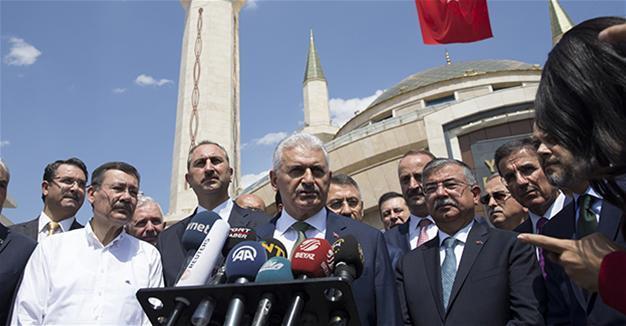Ankara urges calm as tensions rise in Jerusalem
ANKARA / JERUSALEM

AA photo
As tensions mount in Jerusalem after new Israeli security measures at the highly sensitive Al-Aqsa mosque in the Old City of Jerusalem, Turkish Prime Minister Binali Yıldırım has urged calm, stressing the Islamic world’s sensitivity on the issue.“Their implementation is wrong,” Yıldırım said about the Israeli measures.
“Taking such radical measures over a terror threat, blocking or restricting Muslims’ access to Al-Aqsa mosque, will not contribute to solving any problems,” he added.
Israeli police placed metal detectors at the entrances to the mosque compound following a gun attack last week that left two Israeli police officers dead as three Arab Israeli assailants were also killed at the spot near the site known to Jews as the Temple Mount.
On July 21 thousands of Palestinians prayed in the streets around the site. A Palestinian died after being shot in the head, the Palestinian health ministry said, as clashes broke out in the area.
The ministry however did not specify who was behind the shooting in the Ras al-Amud neighborhood.
In anticipation of protests on July 21, Israeli police barred men under 50 from entering Jerusalem’s Old City for prayers, while all women were allowed in.
Speaking to journalists in Ankara, Yıldırım said the restrictions would instead damage “tolerance” between civilizations and religions.
“I hope that in the near future everything will return to normal,” he added.
A group of several hundred people, including Muslim leaders, marched toward the Lions Gate entrance to the mosque compound.
Police later fired stun grenades and tear gas toward protesters outside the Old City, while Palestinians threw stones and other objects at security forces in some areas.
“They turned back everyone who came here to pray but then I told them I was going to the doctor, but they did not let me in,” said Ulfat Hamad, 42, who was visiting from the United States. “I am going to pray here with others,” he said outside the walls, as reported by Agence France-Presse.
The controversy has resonated beyond Israel and the Palestinian territories, with the United States and the U.N.’s Middle East envoy expressing concern.
Palestinian President Mahmoud Abbas spoke with U.S. counterpart Donald Trump’s senior adviser and son-in-law Jared Kushner.
He urged the U.S. administration to immediately intervene warning that the situation was “extremely dangerous and might spiral out of control,” Palestinian official Wafa news agency reported.
Turkish President Recep Tayyip Erdoğan too has called on Israel to remove the detectors. He spoke by telephone with both Abbas and Israeli President Reuven Rivlin on July 20.
Israeli Prime Minister Benjamin Netanyahu stressed that the metal detectors were intended to ensure the safety of worshippers and visitors and not an attempt to disturb the fragile status quo under which Jordan is custodian of the site and Jewish prayer is forbidden.
Palestinians have been refusing to enter the compound all week in protest at the metal detectors.
The main weekly prayers on Fridays draw the largest number of worshippers - typically thousands - and speculation had been mounting that Netanyahu might order the metal detectors removed.
But after consultations with security chiefs and members of his security cabinet, Netanyahu decided not to order them removed.
Police said they had boosted their forces in and around the Old City, with units “mobilized in all areas and neighborhoods.”
















